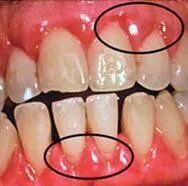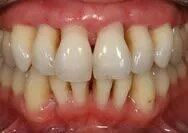Gingivitis In Oakland, CA
Bleeding Gum Treatment
1. “My Gums Bleed When I Brush My Teeth” , “When I Floss My Gums Bleed.”
These are two phrases I hear frequently, usually followed by…
“Why Do I Have Bleeding Gums?”
Here is the short answer:
Every time you eat food is forced between your teeth. Sometimes the food between your teeth is big enough to feel but most times it is not. This food will either be removed by flossing and brushing or it will stay where it is, in a nice warm moist environment – until it breaks down into bacteria and acids. The acids cause tooth decay and the bacteria causes gum disease.
The first stage of gum disease (also known as periodontal disease) is gingivitis. Gingivitis is an inflammation of the gum tissue caused by bacteria wherein the gingival tissue becomes red, swollen and forms blood blisters inside the pockets of gum tissue surrounding your teeth (periodontal pockets). When these blood blisters are disturbed by either brushing or flossing they break open and blood rises to the top of the gingiva where you can see it.
2. “I Don’t Like To Floss Because It Makes My Gums Bleed.
"If It Makes My Gums Bleed Why Should I Floss?”
This the next most common thing I hear. My answer is this is… floss to remove the source of infection.
If you don’t floss, the bacteria that cause gingivitis will destroy the fibers that attach your gum tissue to your teeth. When this happens the depth of the collar of gum tissue around your teeth increases. If the pockets become too deep you will no longer be able to remove the food and debris by brushing and flossing. When this happens the pockets become progressively deeper and the periodontal (gum) disease will worsen. Gum disease (Periodontal Disease) is the leading cause of tooth loss among adults in the United States. I believe this is because it never hurts and it is so common that people convince themselves that bleeding gums is normal.
Gum Disease Symptoms
The only symptoms you will have as the disease progresses are redness of the gums surrounding the teeth, puffy or swollen gum tissue and painless bleeding. You may also experience a bad taste in your mouth from an abscess (pus) in the gum pockets and persistent bad breath as a result of food being metabolized (rotting) deep in the gingival pockets.

Gum Disease Consequences
As more bone is lost your teeth will only be held in by their gum attachments. It will start to hurt to chew as you stretch those attachments around your teeth and the teeth may come out on their own while chewing.
Once you lose teeth due to periodontal disease your options to replace them will be limited and expensive (thousands of dollars) because there is not enough bone to support less expensive tooth replacement options. Bone grafting is not possible in all situations. This often leaves dentures as the only viable / affordable alternative.
The Best Gum Disease Treatment Is Prevention.
How Can You Stay Healthy And Avoid Gum Disease And Tooth Loss?
A. Floss your teeth BEFORE you brush them EVERY TIME you brush your teeth. Why?
- Brushing only cleans 60% of your teeth. 40% of tooth surface is between your teeth where only floss most effectively cleans.
- You will remove the particles of food between your teeth so the fluoride, tartar control, whitening, etc. in your toothpaste can reach those areas of your teeth.
- You will have all the time while you are flossing and brushing to remove the particles of food from your mouth
- You will be less likely to forget or get distracted and not floss if you do your flossing first.
B. Brush your teeth, tongue and gums to remove plaque and food debris.
C. Rinse and IF your gums are bleeding use an antimicrobial rinse such as Listerine or a herbal rinse that will kill the germs associated with gingivitis. If your gums are not bleeding after you floss and brush rinse with plain water.
D. Have regular professional cleanings or periodontal maintenance (if you already have periodontal disease) to stay healthy or maintain the bone you currently have.

What Should You Do If You Have Bleeding Gums?
See your dentist for a professional exam and cleaning. Ideally your teeth should be flossed and brushed three times a day. I recommend that you not tie flossing and brushing to meal times because it is too inconvenient. Floss, then brush your teeth and tongue and rinse afterward: (1) when you first wake up, (2) when you first return home from school or work (don’t come out of the bathroom until you do) and (3) before bed. The objective is to disturb the colonization of plaque bacteria and not let it sit undisturbed for too long. If you do this calculus (tartar) will never be able to attach to your teeth. I have heard many people say that they think twice a day is enough. Well, what happens if you miss one of those two times? The plaque bacteria have 24 hours to organize and grow.
Look at it this way. Let’s say you have breakfast and you eat as much as you can off of your plate. Your plate is still dirty because there are small amounts of food left behind, you know how dirty dishes look. Now, imagine that instead of washing that plate you wrap it in a moist towel and place it in an oven at 98.6 degrees Fahrenheit (average body temperature) and let it sit there until lunch. You unwrap that same plate and put your lunch on it then eat. When you are finished you wrap that plate in your moist towel and put it back in the oven until dinner. Out comes that great looking (and smelling) plate again. Time for dinner! After dinner you wrap your same plate again, along with small bits of breakfast, lunch, dinner and whatever snacks you ate in your warm, moist towel then put it back in the oven for the 7 – 8 hours you sleep at night. Fresh breath in the morning? I think not.
It’s not hard to imagine why your gums become infected and bleed now, is it? – especially if you do this day in and day out.
I hear your next question coming, “If I brush at night, why do I still have to brush in the morning? This is why. You are cleaning, not sterilizing your mouth. There are still living organisms in there. Your body is working while you are sleeping, digesting food, growing fingernails, etc. Metabolism happens and plaque forms.
Be the old person with all of their teeth. It will improve your quality of life.
Make an appointment today to have your gums checked.
Learn more about gingivitis and periodontal disease and gum disease treatment.

Bleeding Gum Treatment
1. “My Gums Bleed When I Brush My Teeth” , “When I Floss My Gums Bleed.”
These are two phrases I hear frequently, usually followed by…
“Why Do I Have Bleeding Gums?”
Here is the short answer:
Every time you eat food is forced between your teeth. Sometimes the food between your teeth is big enough to feel but most times it is not. This food will either be removed by flossing and brushing or it will stay where it is, in a nice warm moist environment – until it breaks down into bacteria and acids. The acids cause tooth decay and the bacteria causes gum disease.
The first stage of gum disease (also known as periodontal disease) is gingivitis. Gingivitis is an inflammation of the gum tissue caused by bacteria wherein the gingival tissue becomes red, swollen and forms blood blisters inside the pockets of gum tissue surrounding your teeth (periodontal pockets). When these blood blisters are disturbed by either brushing or flossing they break open and blood rises to the top of the gingiva where you can see it.
2. “I Don’t Like To Floss Because It Makes My Gums Bleed.
"If It Makes My Gums Bleed Why Should I Floss?”
This the next most common thing I hear. My answer is this is… floss to remove the source of infection.
If you don’t floss, the bacteria that cause gingivitis will destroy the fibers that attach your gum tissue to your teeth. When this happens the depth of the collar of gum tissue around your teeth increases. If the pockets become too deep you will no longer be able to remove the food and debris by brushing and flossing. When this happens the pockets become progressively deeper and the periodontal (gum) disease will worsen.

Gum disease (Periodontal Disease) is the leading cause of tooth loss among adults in the United States. I believe this is because it never hurts and it is so common that people convince themselves that bleeding gums is normal.
Gum Disease Symptoms
The only symptoms you will have as the disease progresses are redness of the gums surrounding the teeth, puffy or swollen gum tissue and painless bleeding. You may also experience a bad taste in your mouth from an abscess (pus) in the gum pockets and persistent bad breath as a result of food being metabolized (rotting) deep in the gingival pockets.
Gum Disease Consequences
As more bone is lost your teeth will only be held in by their gum attachments. It will start to hurt to chew as you stretch those attachments around your teeth and the teeth may come out on their own while chewing.
Once you lose teeth due to periodontal disease your options to replace them will be limited and expensive (thousands of dollars) because there is not enough bone to support less expensive tooth replacement options. Bone grafting is not possible in all situations. This often leaves dentures as the only viable / affordable alternative.
The Best Gum Disease Treatment Is Prevention.
How Can You Stay Healthy And Avoid Gum Disease And Tooth Loss?
A. Floss your teeth BEFORE you brush them EVERY TIME you brush your teeth. Why?
- Brushing only cleans 60% of your teeth. 40% of tooth surface is between your teeth where only floss most effectively cleans.
- You will remove the particles of food between your teeth so the fluoride, tartar control, whitening, etc. in your toothpaste can reach those areas of your teeth.
- You will have all the time while you are flossing and brushing to remove the particles of food from your mouth
- You will be less likely to forget or get distracted and not floss if you do your flossing first.

B. Brush your teeth, tongue and gums to remove plaque and food debris.
C. Rinse and IF your gums are bleeding use an antimicrobial rinse such as Listerine or a herbal rinse that will kill the germs associated with gingivitis. If your gums are not bleeding after you floss and brush rinse with plain water.
D. Have regular professional cleanings or periodontal maintenance (if you already have periodontal disease) to stay healthy or maintain the bone you currently have.
What Should You Do If You Have Bleeding Gums?
See your dentist for a professional exam and cleaning. Ideally your teeth should be flossed and brushed three times a day. I recommend that you not tie flossing and brushing to meal times because it is too inconvenient. Floss, then brush your teeth and tongue and rinse afterward: (1) when you first wake up, (2) when you first return home from school or work (don’t come out of the bathroom until you do) and (3) before bed. The objective is to disturb the colonization of plaque bacteria and not let it sit undisturbed for too long. If you do this calculus (tartar) will never be able to attach to your teeth. I have heard many people say that they think twice a day is enough. Well, what happens if you miss one of those two times? The plaque bacteria have 24 hours to organize and grow.
Look at it this way. Let’s say you have breakfast and you eat as much as you can off of your plate. Your plate is still dirty because there are small amounts of food left behind, you know how dirty dishes look. Now, imagine that instead of washing that plate you wrap it in a moist towel and place it in an oven at 98.6 degrees Fahrenheit (average body temperature) and let it sit there until lunch.

You unwrap that same plate and put your lunch on it then eat. When you are finished you wrap that plate in your moist towel and put it back in the oven until dinner. Out comes that great looking (and smelling) plate again. Time for dinner! After dinner you wrap your same plate again, along with small bits of breakfast, lunch, dinner and whatever snacks you ate in your warm, moist towel then put it back in the oven for the 7 – 8 hours you sleep at night. Fresh breath in the morning? I think not.
It’s not hard to imagine why your gums become infected and bleed now, is it? – especially if you do this day in and day out.
I hear your next question coming, “If I brush at night, why do I still have to brush in the morning? This is why. You are cleaning, not sterilizing your mouth. There are still living organisms in there. Your body is working while you are sleeping, digesting food, growing fingernails, etc. Metabolism happens and plaque forms.
Be the old person with all of their teeth. It will improve your quality of life.
Make an appointment today to have your gums checked.
Learn more about gingivitis and periodontal disease and gum disease treatment.
